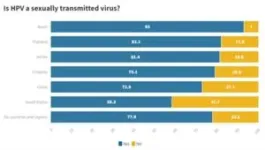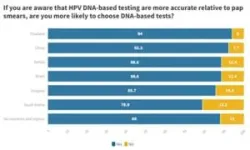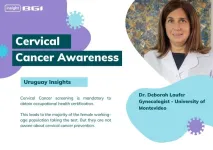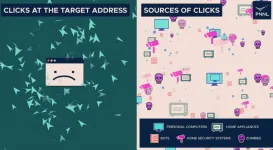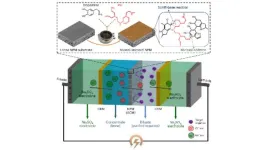(Press-News.org) Research at the Florida State University College of Medicine has identified a potential low-cost method for predicting if a person is at risk of developing dementia.
By analyzing data from nearly 13,000 subjects who participated in a long-term aging study, researchers found that an interviewer’s rating of a cognitively healthy person’s memory successfully predicted the likelihood of developing dementia over a 15-year period. Their findings will be published in the Journal of Alzheimer’s Disease.
“Our findings show that interviewers were able to detect deficits in the memory of participants that predicted higher risk of developing dementia over time,” said research author Angelina Sutin, professor of Behavioral Sciences and Social Medicine. “The interviewer ratings of memory were particularly important for participants who were among the top performers on objective memory tests.”
The results show that ratings of a person’s memory performance by an interviewer could be a valuable alternative or addition to other methods of detection, such as self reporting or cognitive testing.
Sutin’s team analyzed 15 years of data involving nearly 13,000 people without cognitive impairment at baseline who participated in the University of Michigan Health and Retirement Study, or HRS, and whose memory was rated by their interviewer. The longitudinal study surveys a representative sample of adults aged 50 and older about their health, financial situation and well-being every two years for as long as they choose to remain in the study.
Sutin’s sample included participants who were interviewed in 2006 and scored within the normal range of cognitive function during their first interview and had at least one follow-up assessment of cognition between 2008-2020.
Interviewers were trained research assistants working for the HRS who conducted the 2-3 hour interviews and rated the item, “How much difficulty did the respondent have remembering things that you asked (him/her) about?” from 1 (no difficulty) to 5 (could not do at all).
Interviewer-rated memory was entered as a predictor of incident dementia across the 15-year follow-up period. They found that each 1-point increase in poor memory as rated by the interviewer (on the 1-5 scale) was associated with a 40% increase in risk of developing dementia at some point over the follow-up period. This association was apparent even after accounting for potential swaying factors such as depression and poor hearing. Whether the interview was face-to-face or over the phone had no effect on the results.
Notably, the association was even stronger among participants with the best objective memory performance (remembering many words from a long list of words) and subjective memory (how well someone perceives their memory to be). Both objective and subjective memory have been useful in detecting cognitive deficits preceding a diagnosis of dementia.
Of particular interest, Sutin said, is that the results were consistent even among participants who scored in the top quartile of memory function at baseline. Such performance on an objective memory test typically suggests that the individual has good cognitive function and is not at risk of impairment.
“This simple rating by an interviewer is predictive of who develops dementia, particularly when traditional measures of memory function do not necessarily detect memory deficits,” Sutin said. “And the association is similar across age, sex, race, ethnicity and education, which suggests it may be broadly predictive across populations. Overall, we believe these findings show that interviewer-rated memory was a good marker of future dementia among the most cognitively healthy.”
Sutin said the findings support growing evidence for the importance of subjective ratings of memory and extends the association to observers who are not necessarily well-acquainted with the target. Clinicians generally rely on family members in gathering information on cognitive function. This study indicates that an interview with a stranger can also provide valuable information on prospective cognitive health.
Based on the findings, a simple interviewer rating has the long-term power to predict who may develop dementia and could be useful for clinicians in providing effective treatment.
Co-authors on the study were Professor Antonio Terracciano and Assistant Professor Martina Luchetti from Florida State University, Darmris Aschwanden of the University of Geneva in Switzerland and Yannick Stephan of the University of Montpellier in France.
This work was supported by the National Institute on Aging of the National Institutes of Health.
END
FSU researcher finds potential new tool for early identification of dementia risk
2023-08-03
ELSE PRESS RELEASES FROM THIS DATE:
Current takes a surprising path in quantum material
2023-08-03
ITHACA, N.Y. -- Cornell researchers used magnetic imaging to obtain the first direct visualization of how electrons flow in a special type of insulator, and by doing so they discovered that the transport current moves through the interior of the material, rather than at the edges, as scientists had long assumed.
The finding provides new insights into the electron behavior in so-called quantum anomalous Hall insulators and should help settle a decades-long debate about how current flows in more general quantum Hall insulators. These insights will inform the development of topological materials for next-generation quantum devices.
The team’s paper, “Direct ...
Professor Deborah Laufer discusses barriers to cervical cancer screening in Uruguay – BGI Insights
2023-08-03
The recently released BGI Genomics 2023 Global State of Cervical Cancer Awareness Report highlights the level of knowledge, attitudes, and practices related to cervical cancer screening and the human papillomavirus (HPV) on a global scale.
Dr. Deborah Laufer, a gynecologist and Associate Professor at the Faculty of Medicine in the University of Montevideo, offers her insights on this report's findings and the steps needed to improve cervical cancer awareness in Uruguay.
Q: 40% of respondents worldwide did not choose HPV as the key cause of cervical cancer. 37% in Uruguay did not mention it either. ...
Researchers strengthen defenses against common cyberattack
2023-08-03
RICHLAND, Wash.—Scientists have developed a better way to recognize a common internet attack, improving detection by 90 percent compared to current methods.
The new technique developed by computer scientists at the Department of Energy’s Pacific Northwest National Laboratory works by keeping a watchful eye over ever-changing traffic patterns on the internet. The findings were presented on August 2 by PNNL scientist Omer Subasi at the IEEE International Conference on Cyber Security and Resilience, where the manuscript was recognized as the best research paper presented at the meeting.
The ...
Mussel-inspired membrane can boost sustainability and add value to industrial wastewater treatment
2023-08-03
Engineers have developed a new kind of membrane that separates chemicals within wastewater so effectively that they can be reused, presenting a new opportunity for industries to improve sustainability, while extracting valuable by-products and chemicals from wastewater.
Created for use in wastewater treatment, the thin-film composite nanoporous membrane known as a TFC NPM, exhibits an ‘unprecedented’ capability to separate salts and other chemical components from water, and could lead to more sustainable treatment and management of water in a range of industries.
A research ...
CAR-T immune therapy attacks ovarian cancer in mice with a single dose
2023-08-03
CHAMPAIGN, Ill. — CAR-T immune therapies could be effective against solid tumors if the right targets are identified, a new study led by University of Illinois Urbana-Champaign researchers suggests. The researchers successfully deployed CAR-T in a mouse model of ovarian cancer, a type of aggressive, solid-tumor cancer that has eluded such therapies until now.
“Even with an advanced stage tumor model, even with a single dose, we saw strong anti-tumor effects,” said Diana Rose Ranoa, ...
GABA receptors in brain could be targets to treat depression and its cognitive symptoms
2023-08-03
CHAMPAIGN, Ill. — Depression is a complex condition correlated with multiple differences in brain function and mechanisms. A new paper spanning known data about the neurotransmitter GABA and its principal receptors showcases evidence of the receptors’ importance in depression and potential as therapeutic targets.
Based on evidence from research on the receptors’ function in the brain and the drugs that can activate or inhibit them, the authors propose possible mechanisms by which GABA-modulating treatments could ...
New clinical trial to assess canine cancer treatment
2023-08-03
DENVER/Aug. 3, 2023 – A newly funded study will evaluate the potential of a cancer drug to control tumor growth and improve outcomes for dogs with histiocytic sarcoma, an aggressive and typically fatal canine cancer.
The multi-center clinical trial is being conducted at Michigan State University, University of Florida, University of Wisconsin and Virginia Tech, and funded by the Bernese Mountain Dog Club of America through Morris Animal Foundation's Donor-Inspired Study program. Histiocytic sarcoma was ...
How sensory neurons impact the gut
2023-08-03
LA JOLLA, CA—Gastrointestinal and digestive issues impact roughly 3 million people across the United States alone, and that number is growing. A new study from Scripps Research scientists shows how sensory neurons control our gastrointestinal tracts—critical information that could shape our understanding of related diseases and disorders.
The study, published in the journal Cell on Aug. 3rd, 2023, used a combination of human clinical data and animal models to reveal that the receptor PIEZO2 controls gastrointestinal transit through the stomach, small intestine, and colon by sensing the presence of food and slowing the rate of gut motility accordingly. These ...
Study finds hallmarks of T cell exhaustion within hours of tumor exposure
2023-08-03
Immune system T cells that should be able to kill cancer cells become dysfunctional or “exhausted” within hours of encountering a tumor, according to a study reported Aug. 3 in Nature Immunology.
The surprising findings have implications for cancer immunotherapies that aim to harness the tumor-killing power of T cells, and they challenge existing ideas about how T cells become exhausted, said Mary Philip, MD, PhD, assistant professor of Medicine in the Division of Hematology and Oncology ...
New research casts doubt on role of fungus in driving pancreatic cancer
2023-08-03
DURHAM, N.C. – Four years ago, a report that a common species of fungus might fuel pancreatic cancer offered a promising new view of the deadly disease.
But in working to validate the finding, Duke Health researchers have found no such association. In a study appearing online Aug. 3 in the journal Nature, the Duke researchers conducted a multi-pronged analysis of data from the earlier study and found no link between the pancreatic microbiome and the development of pancreatic cancer.
“We were intrigued by the original finding, as were ...

